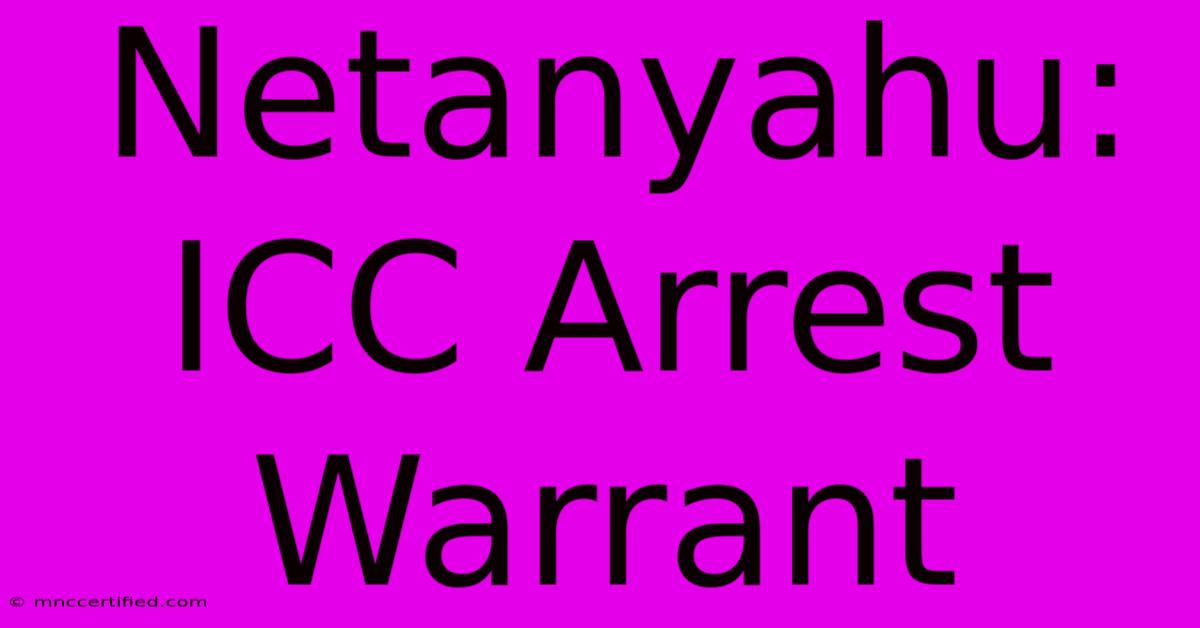Netanyahu: ICC Arrest Warrant

Table of Contents
Netanyahu: ICC Arrest Warrant – A Deep Dive into the Controversy
The International Criminal Court's (ICC) issuance of an arrest warrant for Israeli Prime Minister Benjamin Netanyahu has ignited a firestorm of international debate. This article delves into the complexities surrounding the warrant, examining its legal basis, the political ramifications, and the potential implications for both Israel and the ICC itself.
Understanding the ICC's Jurisdiction and the Charges
The ICC's warrant alleges war crimes and crimes against humanity committed during Israel's 2014 military operation in Gaza, known as Operation Protective Edge. The specific charges remain under investigation, but the warrant's issuance itself is a significant development. It's crucial to understand that the ICC's jurisdiction is predicated on the principle of complementarity – it only investigates and prosecutes when national jurisdictions are unwilling or unable genuinely to do so. Israel, however, vehemently disputes the ICC's authority, asserting that it's a biased and politically motivated body.
The Legal Basis of the Warrant
The ICC's Rome Statute, which established the court, forms the legal basis for the warrant. Article 15 outlines the procedure for initiating investigations, while Article 5 details the crimes under the court's jurisdiction, including war crimes, crimes against humanity, and genocide. Proponents of the warrant argue that the ICC has followed due process and presented sufficient evidence to warrant Netanyahu's arrest. Critics, however, contend that the ICC is overstepping its authority and that the evidence is insufficient or politically charged.
Political Fallout and International Reactions
The warrant has dramatically escalated tensions in the already volatile Middle East. Israel has condemned the decision strongly, viewing it as an attack on its sovereignty and a blatant act of anti-Semitism. The Israeli government has refused to cooperate with the ICC, and Netanyahu's allies have rallied behind him, decrying the court's legitimacy. Meanwhile, Palestinian authorities have hailed the warrant as a victory, although their own perspective is equally contested.
International Responses: A Divided World
The international community is sharply divided in its response. The United States, a staunch ally of Israel, has voiced strong opposition to the warrant, suggesting that the ICC lacks jurisdiction over Israeli actions. Other countries, however, have expressed support for the ICC's efforts to hold individuals accountable for alleged war crimes. This division highlights the complex geopolitical landscape and underscores the inherent challenges of international justice.
Implications for the ICC and the Future of International Law
The issuance of the arrest warrant has raised serious questions about the ICC's future and the effectiveness of international law in addressing complex conflicts. Critics argue that the ICC is biased against Israel and that its actions undermine the rule of international law. The warrant could also exacerbate existing tensions between the ICC and states that do not recognize its jurisdiction, potentially leading to further challenges to the court's authority. On the other hand, supporters argue that the warrant represents a crucial step towards accountability and that the ICC's role in upholding international justice must be defended.
Conclusion: An Ongoing Saga
The ICC arrest warrant for Benjamin Netanyahu is a multifaceted issue with far-reaching implications. The legal arguments, political ramifications, and international responses all contribute to a complex situation with no easy answers. The ongoing debate highlights the tension between national sovereignty and international justice, and the challenges of applying international law in highly charged political contexts. Further developments in the case are likely to significantly shape the future of the ICC and the broader landscape of international criminal justice. The situation remains fluid, and continued monitoring is essential to understanding its evolving impact.
Keywords: Netanyahu, ICC, International Criminal Court, arrest warrant, war crimes, crimes against humanity, Operation Protective Edge, Gaza, Israel, Palestine, international law, international justice, political ramifications, geopolitical tensions, Rome Statute, Article 15, Article 5, sovereignty, accountability.

Thank you for visiting our website wich cover about Netanyahu: ICC Arrest Warrant. We hope the information provided has been useful to you. Feel free to contact us if you have any questions or need further assistance. See you next time and dont miss to bookmark.
Featured Posts
-
Help My Friends Boba Habit
Nov 22, 2024
-
Gap Insurance Westlake Financial
Nov 22, 2024
-
Storm Bert Weather Update And Impacts
Nov 22, 2024
-
Gautam Adani The Us Case Details
Nov 22, 2024
-
New Initiative Penn Engineering On Responsible Innovation
Nov 22, 2024